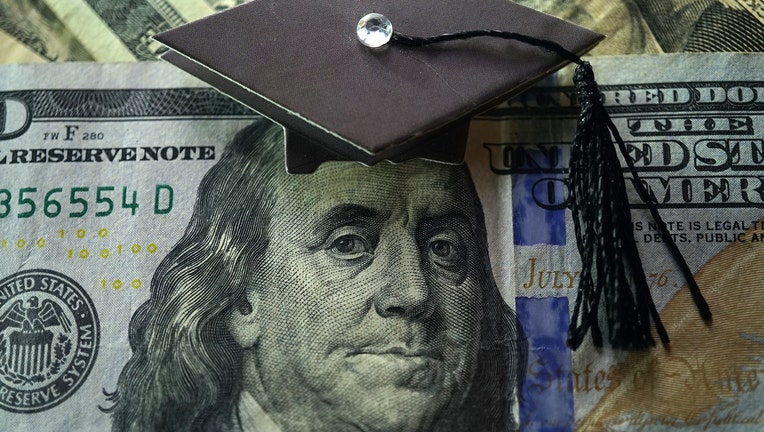Will private student loans be forgiven? 3 ways borrowers can manage their debt now

Student loan forgiveness may be in the cards, but not for a while — and only for certain types of loans. (iStock)
If you have federal student loans, your monthly payments are on pause at least through September 30 thanks to President Joe Biden extended the loan payment suspension period soon after entering office.
And while that can certainly provide some much-needed loan relief if a student loan borrower was suffering undue hardship related to the coronavirus pandemic, it’s not a permanent solution by any means — especially if you were struggling with student loan repayment before COVID-19.
But what if you have private student loan debt? Read on for the latest federal stance on student loan forgiveness, and if you're considering refinancing your private student loans, be sure to use an online tool like Credible to compare student loan refinancing rates from multiple lenders without affecting your credit score.
RATES FOR STUDENT LOAN REFINANCING HAVE NEVER BEEN LOWER
Will private student loans be forgiven?
A recent $1.9 trillion coronavirus relief bill did not include any provision to cancel student debt, even though Biden and members of Congress had discussed forgiving anywhere from $10,000 to $50,000 in student debt. While a proposal to forgive debt could come through an executive order, the plan would likely apply only to federal student loans.
"From a financial planning perspective, the proposals of student loan forgiveness leave borrowers in a tough spot," said Brad Griffith, a financial planner at Buckingham Advisors. "It’s still unclear how realistic it is that any forgiveness package makes it through Congress, so borrowers are left waiting on if the loans will be forgiven and how long they have to wait."
If you’re one of the many borrowers hoping your federal student loans will be canceled in the near-term, Griffith recommends a proactive approach. Take advantage of your paused payments, and start saving up in case loan forgiveness is delayed or comes in less than you expect.
If you have private student loans and looking to lower monthly payments and ease the burden of student loan debt, then consider refinancing your student loans. Lock in some of the lowest interest rates ever via the online marketplace Credible.
5 STUDENT LOAN REFORMS TO WATCH FOR
How can I lower my private student loan payments?
You can consider one of the following strategies while loan forgiveness plans are being fleshed out.
1. Refinance your private student loans
Interest rates have fallen over the past year, so if you have private student loans, you’ll want to at least consider a loan refinance Check your current loan’s rate and use an online tool like Credible to view refinance rates from private lenders across the country.
If current loan rates are lower than what’s on your existing loan, it might make sense to refinance your student loans (it could reduce your monthly payment, as well as your long-term costs). To see if loan refinancing would work in your favor, use an online student loan refinance calculator to determine your new monthly payments and interest savings.
Be careful, though: This path is best reserved for private student loans only.
"It’s important to remember that if you’re counting on forgiveness to not include your federal loans in the refinance," Griffith said. "That would likely disqualify those loans for potential forgiveness."
You can also estimate how long it will take to pay off your private student loan by using Credible's student loan repayment calculator.
WHO BENEFITS FROM STUDENT LOAN FORGIVENESS?
2. Pay off private student loans first
If you have both federal and private student loans, consider using this time to pay down your private loan balances more aggressively.
With federal loans on pause, you may have more cash flow to devote to those private student loans — and that can mean saving more in the long run.
"The federal interest and payment forbearance allows borrowers some time to get their financial house in order — building an emergency fund, paying off high-interest-rate debts and paying down private loans," Griffith said.
Also, as you're prioritizing these loans, see if you can lower your payments through refinancing your student loans. Credible can help you compare rates and private lenders within minutes.
SHOULD YOU REFINANCE YOUR STUDENT LOANS NOW? HERE'S WHAT TO KNOW
3. Talk to your loan servicer
You should also call up your loan servicer and let them know you’re struggling to make payments. They may have solutions that can help, including various repayment plans, loan modifications and more.
On federal loans, for example, you can use an income-driven repayment plan, which bases your monthly payments on the income you bring in. (You’d use this after the current forbearance period expires in September).
Refinancing your student loans may be able to help here, as well. Just make sure you shop around and multiple lenders, as rates and terms can vary widely from one company to the next.
WILL STUDENT LOANS BE FORGIVEN IN 2021?
Start planning today
Student loan forgiveness is still in the very early stages, so if you have debts to your name, you’ll want to consider other options while these plans get fleshed out. If you have private student loans, think about refinancing to lower your interest rate and monthly payments. Just make sure you use an online tool like Credible to make sure you’re getting the best deal possible.
If you have federal loans, leverage your payment pause to reduce other debts or save up for when payments come due in October. If you’re still struggling to make monthly payments at that point, call up your loan servicer. They may have options that can help.

